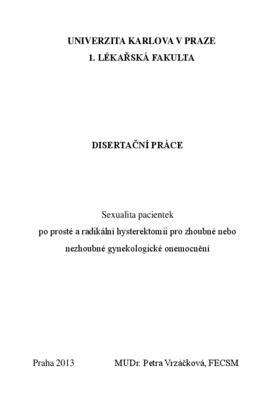Sexualita pacientek po prosté a radikální hysterektomii pro zhoubné nebo nezhoubné gynekologické onemocnění
Sexuality of patients after simple and radical hysterectomy for bening or malignant gynaecologic disease
dizertační práce (OBHÁJENO)

Zobrazit/
Trvalý odkaz
http://hdl.handle.net/20.500.11956/53295Identifikátory
SIS: 85990
Katalog UK: 990016294170106986
Kolekce
- Kvalifikační práce [4903]
Autor
Vedoucí práce
Oponent práce
Tošner, Jindřich
Kubíček, Vladimír
Fakulta / součást
1. lékařská fakulta
Obor
-
Katedra / ústav / klinika
Gynekologicko-porodnická klinika 1. LF UK a VFN v Praze
Datum obhajoby
30. 9. 2013
Nakladatel
Univerzita Karlova, 1. lékařská fakultaJazyk
Čeština
Známka
Prospěl/a
Klíčová slova (česky)
dyspareunie, karcinom děložního hrdla, porucha sexuální touhy, porucha vzrušivosti, prostá hysterektomie, psychosexuální poradenství, radikální hysterektomieKlíčová slova (anglicky)
arousal disorder, cervical cancer, dyspareunia, psychosexual counselling, radical hysterectomy sexual desire disorder, simple hysterectomyÚvod: Karcinom děložního hrdla je často diagnózou velmi mladých, sexuálně aktivních žen. Radikální hysterektomie, jako základní léčebná modalita v časných stadiích onemocnění, umožňuje dosažení velmi příznivých onkologických výsledků. Na druhé straně má také svou nezanedbatelnou morbiditu, která se týká především dysfunkcí močového měchýře a rekta, lymfedémů a zhoršení sexuálního života pacientky. Metodika: Pro prospektivní analýzu byla využita data 41 pacientek, které podstoupily radikální hysterektomii pro karcinom děložního hrdla, 49 pacientek podstupujících prostou hysterektomii pro benigní gynekologické onemocnění a 53 zdravých kontrol. Pacientky vyplnily dotazníky týkající se sexuálních funkcí a kvality života před operací a následně 6 a 12 měsíců po operaci. Výsledky: Nejdůležitějším zjištěním byl průkaz dlouhodobého a signifikantního zhoršení objektivní vzrušivosti u pacientek po radikální hysterektomii (p = 0,041). Dále byl zaznamenán pokles sexuální touhy a vyšší frekvence bolestí během sexuálních aktivit. V souboru žen po prosté hysterektomii byl trend výskytu sexuálních obtíží klesající, především snížení frekvence výrazné dyspareunie. Souhrn: Radikální hysterektomie pro karcinom děložního hrdla představuje riziko vzniku poruch vzrušivosti, pokles libida a zhoršení dyspareunie. Psychosexuální...
Background: Cervical carcinoma is frequently diagnosis of young, sexually active women. Radical hysterectomy, as a basic therapeutic modality of early stages of cervical cancer, has very positive oncogynaecologic results. On the opposite site it has it's significant morbidity including bladder and rectal dysfunctions, lymphedemas, and deterioration in patient's sexual life. Methods: Data of forty one patients undergoing radical hysterectomy for cervical cancer were used for analysis, as well as data of forty nine patients undergoing simple hysterectomy for benign gynacologic disease and fifty three healthy controls Participants filled out sexual function and quality of life questionnaires before surgery and three and six months postoperatively. Results: The most important finding was statistically significant worsening in objective arousal in cervical cancer patients (p = 0,041). Also decrease in libido and higher frequency of dyspareunia was registered. Patients undergoing simple hysterectomy showed decreasing trend in sexual dysfunctions, mainly in severe dyspareunia. Conclusions: Radical hysterectomy for cervical carcinoma has a risk of arousal disorder, libido decrease and worsening of dyspareunia. Psychosexual counselling decreases frequency of early postoperative sexual dysfunctions.
